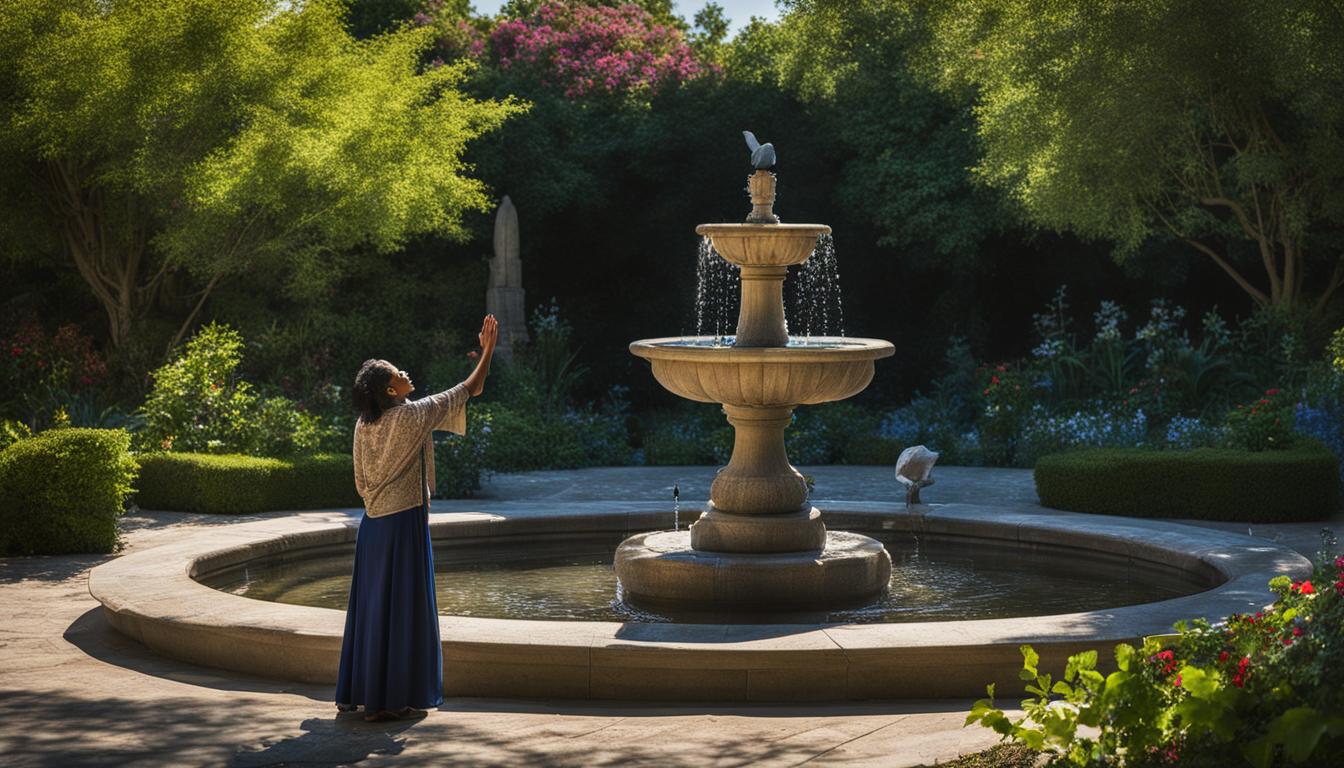After completing the ritual ablution (wudu), Muslims are encouraged to recite specific duas or prayers. These duas hold great significance in Islamic practice, serving as a way to acknowledge the oneness of Allah, affirm faith in Prophet Muhammad, and seek forgiveness and purification from Allah. In this article, we will explore the importance of reciting duas after ablution and the benefits it brings to one’s spiritual practice.
Key Takeaways:
- Reciting specific duas after ablution is an essential part of Islamic practice.
- The duas help to affirm faith in Allah and Prophet Muhammad.
- Reciting duas after ablution brings a sense of calmness and mindfulness.
- It serves as a way to seek forgiveness, purification, and gratitude.
- Incorporating the recitation of dua into daily routines enhances the spiritual experience.
The Importance of Duas After Ablution
After performing the ritual ablution (wudu), reciting duas holds significant importance in Islam. These supplications serve multiple purposes and carry deep meaning for Muslims. They act as a reminder of the oneness of Allah and the status of Prophet Muhammad as His servant and messenger. Additionally, duas following ablution express repentance and a desire to seek forgiveness and purification.
By reciting duas after ablution, individuals elevate the spiritual practice of wudu and bring mindfulness and presence to the act of purification. These prayers serve as a means to seek Allah’s blessings and express gratitude for the opportunity to perform religious rituals. The recitation of duas after ablution contributes to the overall spiritual experience and strengthens the connection between the individual and Allah.
The post-ablution duas, or duas for purification, serve as a powerful way for Muslims to reinforce their faith and deepen their spiritual journey. By incorporating these supplications into their daily routine, individuals can enhance their spiritual practice and find solace in seeking Allah’s forgiveness and guidance.
The significance of mindfulness and spirituality
Reciting duas after ablution not only helps individuals cleanse themselves physically but also brings a sense of calmness and mindfulness. By focusing on the recitation and meanings of the dua, individuals can center their thoughts and increase their concentration during prayer. This practice allows for a deeper connection with Allah and cultivates gratitude.
The Significance of Wudu in Islamic Rituals
Wudu, the ritual ablution in Islam, holds great significance in the performance of various Islamic rituals. It serves as a prerequisite for engaging in acts of worship such as the five daily prayers (salah) and other religious practices. Wudu is seen as a form of both physical and spiritual purification, preparing individuals to establish a direct connection with Allah through prayer.
Through the act of wudu, Muslims symbolically cleanse themselves from impurities, both outwardly and inwardly. This physical cleansing represents the removal of dirt and filth from the body, while the spiritual aspect involves purifying the heart and mind. By performing wudu and adhering to its specific steps, Muslims strive for a state of purity that allows them to engage in worship with a heightened sense of reverence and devotion.
By reciting specific duas, or prayers, after performing ablution, Muslims reinforce the significance of wudu in their daily lives. These prayers serve as a reminder of the spiritual cleansing that has taken place and act as a means to seek forgiveness and purification. By uttering words of repentance and seeking Allah’s grace, individuals affirm their commitment to leading a life of righteousness and seek His blessings in their spiritual journey.
The Benefits of Reciting Dua After Ablution
Reciting dua after ablution brings numerous benefits to one’s spiritual practice. Firstly, it helps create a sense of calmness and mindfulness before engaging in prayers. By focusing on the recitation and meanings of the dua, individuals can center their thoughts and bring a higher level of concentration to their worship. This deepens their connection with Allah and enhances the overall spiritual experience.
Moreover, the recitation of dua after ablution serves as a way to seek forgiveness and purification. By acknowledging the imperfections of the self and seeking Allah’s mercy and guidance, individuals can strive for spiritual growth and seek closeness to their Creator. This practice cultivates a sense of humility and gratitude, fostering a deeper relationship with Allah.
In addition, incorporating the recitation of dua after ablution into daily routines allows Muslims to elevate their spiritual practices. The consistent recitation of these supplications instills discipline and devotion, reinforcing the importance of ablution and its role in preparing for prayer. The act of reciting dua after ablution becomes a meaningful ritual that transforms the mundane into the sacred, infusing each act of purification with spiritual significance.
The Power of Intention
It is important to note that the benefits of dua after ablution are not solely dependent on the act of recitation itself, but also on the intention behind it. When one recites dua after ablution with sincerity and a pure heart, their supplications become a means of connecting with Allah on a deeper level. It is the intention that infuses the recitation with spiritual potency, elevating it from mere words to a heartfelt plea for Allah’s guidance, forgiveness, and blessings.

Conclusion
The recitation of specific duas after ablution is an integral part of Islamic rituals and spiritual practice. Muslims incorporate these prayers into their daily routines to enhance their connection with Allah and deepen their spiritual experience. By reciting these duas, Muslims affirm their faith in the oneness of Allah and acknowledge the status of Prophet Muhammad as His servant and messenger.
In addition to affirming faith, reciting duas after ablution serves multiple purposes. It acts as an expression of repentance and a desire for purification, seeking forgiveness from Allah and striving to be among those who constantly repent and purify themselves. This practice brings a sense of calmness and mindfulness, enabling individuals to approach their prayers with a higher level of concentration and devotion.
Moreover, reciting duas after ablution serves as a way to express gratitude for the opportunity to engage in religious rituals. By acknowledging the imperfections within oneself and seeking Allah’s mercy and guidance, Muslims cultivate a deeper connection with Allah and strengthen their relationship with Him. This practice elevates the spiritual experience of performing ablution and reinforces the significance of this act in Islamic rituals.
By incorporating the recitation of dua after ablution into their daily routines, Muslims can enhance their spiritual practices and nurture their relationship with Allah. This practice brings a deeper sense of devotion, mindfulness, and gratitude to their worship. Whether it is the five daily prayers or other religious rituals, reciting duas after ablution enriches the entire experience and strengthens the bond between the individual and Allah.
FAQ
What should I say after performing ablution?
After completing the ritual ablution, it is recommended to recite the duas “Ash-hadu an laa ilaaha illallaah wahdahu laa shariika lahu, wa ash-hadu anna Muhammadan ‘abduhu wa Rasuuluhu” (I testify that there is no god but Allah, the One, there is no associate with Him and I testify that Muhammad is His servant and His Messenger) and “Allahummaj’alnii minat-tawwabina waj’alni minal-mutatohhirin” (O Allah! Make me among those who repent, and among those who purify themselves).
Why are duas recited after ablution?
Reciting duas after ablution serves several purposes. It reminds Muslims of the oneness of Allah and the status of Prophet Muhammad as His servant and messenger. It is also an expression of repentance and a desire to seek forgiveness and purification. Additionally, reciting duas elevates the spiritual practice of ablution and brings mindfulness and presence to the act of purification.
What is the significance of wudu in Islamic rituals?
Wudu is an essential prerequisite for performing many Islamic rituals, including the five daily prayers (salah). It symbolizes physical and spiritual purification, preparing the individual for direct communication with Allah through prayer. Wudu removes impurities and signifies the readiness to engage in worship.
What are the benefits of reciting dua after ablution?
Reciting dua after ablution brings several benefits. It helps create calmness and mindfulness before prayers, enhancing concentration and devotion. Dua after ablution is also a way to seek forgiveness, purification, and guidance, fostering a deeper connection with Allah. It cultivates gratitude and elevates the overall spiritual experience.
Why is reciting dua after ablution important in Islamic rituals?
The recitation of specific duas after ablution is an integral part of Islamic rituals and spiritual practice. It affirms faith in the oneness of Allah, acknowledges the status of Prophet Muhammad, seeks purification and forgiveness, and expresses gratitude for the opportunity to engage in religious rituals. Reciting dua after ablution strengthens the spiritual connection between the individual and Allah.

